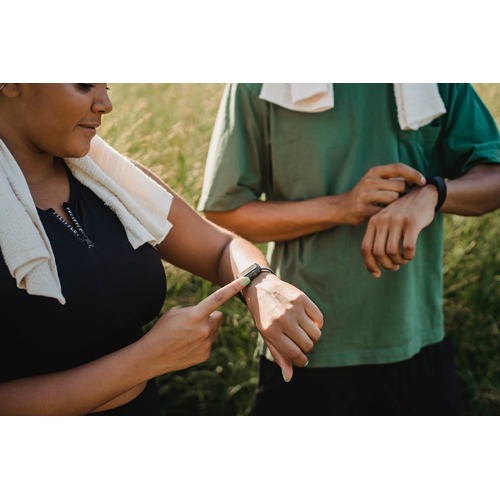Why You Should Start Using a Fitness Tracker (Even If You’re Not Into Fitness)

Fitness trackers have become a common sight on people’s wrists, from sleek smartwatches to minimalist bands that quietly log steps and sleep. At first glance, they seem like tools only for gym-goers, runners, or those training for a marathon. But the truth is, fitness trackers offer benefits far beyond workouts and athletics. Even if you wouldn’t call yourself “into fitness,” wearing one could transform the way you live day to day.
Beyond Counting Steps
Most people associate fitness trackers with step counting, and while that’s certainly one of their core features, today’s devices do much more. From monitoring sleep quality and heart rate to tracking hydration and stress levels, fitness trackers now function as health companions rather than simple pedometers.
For those who don’t exercise regularly, this can still be eye-opening. You may discover that you’re not sleeping as well as you thought, or that your heart rate spikes more often during the day than you realised. These insights don’t demand a gym membership; they simply help you understand your body better.
Encouraging Healthy Habits
One of the greatest strengths of fitness trackers is their ability to nudge users towards small, positive changes. For instance, many trackers remind you to stand up and move if you’ve been sitting too long. They also encourage hydration, alert you when it’s time to wind down for bed, and sometimes even guide you through short breathing exercises to reduce stress.
You don’t need to be an athlete to benefit from these reminders. If you work at a desk for long hours, just being prompted to stretch or take a short walk can make a noticeable difference in how you feel. Over time, these micro-habits add up, subtly improving your overall well-being.
Motivation Without the Pressure
The word “fitness” can feel intimidating. Many people avoid gyms or structured exercise programmes because they don’t want to commit to an intensive regime. Fitness trackers, however, work differently. They provide motivation in a gentle, personalised way.
For example, if your tracker sets a daily step goal of 6,000 steps, you might find yourself walking a little further during your lunch break or opting for the stairs instead of the lift. You’re not forced into a workout routine, but you are nudged towards making healthier choices.
Unlike a personal trainer barking orders, a tracker offers quiet encouragement. It celebrates milestones, whether that’s walking your first 10,000 steps in a day or consistently improving your sleep schedule.
Sleep Tracking and Recovery
Even people uninterested in exercise can appreciate a good night’s rest. Many fitness trackers now include sleep monitoring features that provide data on your sleep duration and quality. By breaking down sleep into stages—light, deep, and REM—you can identify patterns that affect how refreshed you feel in the morning.
If you notice you’re only getting five hours of quality sleep, you might be motivated to adjust your bedtime routine. Similarly, trackers can reveal the impact of late-night screen time, caffeine consumption, or irregular sleep schedules. Better rest leads to improved mood, sharper focus, and stronger immunity—benefits anyone can appreciate, regardless of fitness level.
Stress Management
Modern life is stressful, and many fitness trackers now incorporate features aimed at managing it. Some can measure variations in heart rate to estimate stress levels, while others guide you through short mindfulness or breathing exercises.
These tools are especially valuable for people who don’t identify with traditional fitness but still want to improve mental well-being. By tracking stress, you gain awareness of how daily activities, work, or even social interactions affect you—and with that knowledge, you can take steps to manage it better.
Health Insights and Early Warnings
Fitness trackers can also play a role in preventive health. Devices with continuous heart rate monitoring may flag irregularities, such as unusually high or low resting heart rates. Some advanced trackers can even detect irregular rhythms that might suggest conditions like atrial fibrillation.
While they’re not medical devices, these alerts can prompt timely medical check-ups. For people who wouldn’t normally consider themselves health-conscious, a fitness tracker can act as a silent guardian, highlighting issues before they become serious.
Staying Connected
Another advantage of fitness trackers is their integration with everyday technology. Many models connect with smartphones, allowing you to receive notifications for calls, texts, and emails directly on your wrist. This convenience isn’t limited to fitness fans—it appeals to anyone seeking better organisation in their daily lives.
Whether you’re managing a busy schedule or simply want the freedom to leave your phone in your bag, a fitness tracker provides subtle yet effective assistance.
Accessibility and Style
Fitness trackers come in a wide range of designs and price points, making them accessible to almost everyone. From simple bands focused on health basics to stylish smartwatches that double as fashion accessories, there’s a model for every preference.
This variety means you don’t have to commit to a sporty look if it’s not your style. Many trackers now feature interchangeable straps and sleek designs suitable for professional settings, casual outings, or even formal occasions.
A Lifestyle Companion
Ultimately, a fitness tracker is less about exercise and more about lifestyle. It helps you become more mindful of how you spend your day, encourages balance, and promotes healthier habits without pressure. Even if you never set foot in a gym, you can still benefit from:
-
Improved sleep awareness
-
Gentle activity reminders
-
Stress monitoring and management
-
Early health insights
-
Everyday convenience through connectivity
By thinking of a fitness tracker as a well-being tool rather than a workout accessory, you’ll see just how valuable it can be for anyone—fitness enthusiast or not.
Conclusion
You don’t need to be into fitness to benefit from a fitness tracker. Whether it’s helping you sleep better, reminding you to move, managing stress, or giving early health insights, these devices bring value to everyday life. They’re about making small, sustainable changes that improve overall well-being.
At its core, a fitness tracker isn’t about transforming you into an athlete. It’s about helping you live more mindfully, with a greater awareness of your health and habits. And that’s something everyone, regardless of their relationship with fitness can benefit from.
Explore TBTD Today!
Grab the Best Flight Deals Now
Grab the Best Car Rental Deals Now
Grab the Best Bus Ticket Deals Now
Grab the Best Airport Transfer Deals Now
Grab the Best Adventure Tour Deals Now
Grab the Best Train Ticket Deals Now
Grab the Best Cruise Ticket Deals Now
Explore AP Today!

 Luxury
Luxury
